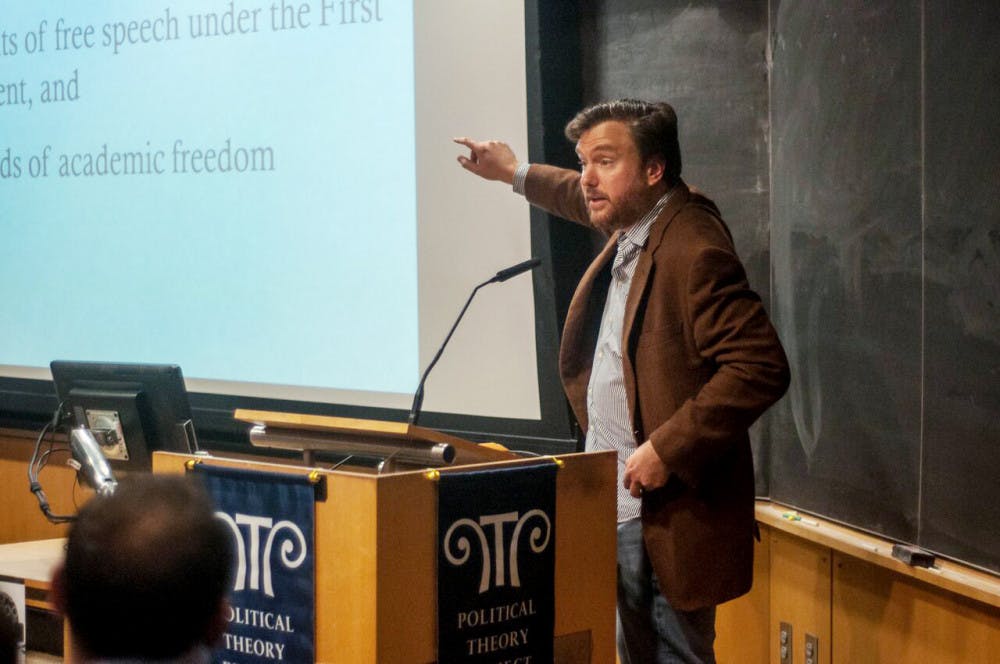At the University’s annual Constitution Day lecture, Greg Lukianoff, president of the Foundation for Individual Rights in Education, and Stanley Fish, visiting professor of Law at Yeshiva University’s Benjamin N. Cardozo School of Law, explored the question: Should free speech be limited on college campuses?
The Political Theory Project hosted the event to provide “a space to come together to hear and discuss challenging topics in good faith,” wrote Daniel D’Amico, associate director of the Political Theory Project, in an email to The Herald.
After an introduction from John Tomasi, professor of political science and director of the Political Theory Project, Lukianoff stepped up to the podium to present his view on the acceptable and unacceptable limits of free speech.
Lukianoff first offered circumstances where free speech should be limited, like “true threats, obscenity and defamation.” He then described situations where free speech should be limited as behavior, not speech. For example, people “don’t have the right to stop an event from happening,” he said.
After listing this variety of situations where free speech can be curtailed, Lukianoff then defined his two beliefs that make him “radical” in his defense of free speech. The first principle is the bedrock rule where, “you can’t ban something simply because it’s offensive … (because) offensive is too subjective,” Lukianoff said. Next, he defended “viewpoint neutrality,” which means “you can’t ban viewpoints you dislike,” he added.
Lukianoff ended his talk with the advice: “Make it a goal to seek out smart people with whom you disagree.”
Fish then stepped up to the microphone. “You have invited two speakers who more or less agree,” he said.
But Fish then argued that, at universities, there is a freedom to do “your academic job,” but should be no freedom of expression. To connect this idea to Brown, Fish quoted President Christina Paxson’s P’19 op-ed in the Washington Post: “Freedom of expression is an essential component of academic freedom.”
“This is false,” Fish said. Universities must protect themselves against outside forces that try to shape their political agenda by employing “gatekeepers” — like deans or professors — who choose what voices should be heard on campus.
Engaging in academia and social justice in the same space is “a debasement of teaching and of social justice,” he said.
“The university is less democratic than it is Darwinian,” he added.
Currently, students are the most toxic force in the politicization of universities, he said. Students are “apprentices” and “have no right to participate in the shaping of the own scene of their instruction,” he added.
Professors and students should try to understand ideas, not craft foreign policy, he added, before ending his speech with a directive to both — “do your job.”
After the two speakers finished their talks, members from the audience asked questions, most of them directed at Fish.
One student asked Fish why professors or administrators should have the authority to limit speech on campus.
“The relationship is between someone who knows the subject and students who want to know the subject,” Fish said.
The student pressed further, adding, “we aren’t arguing about the laws of physics” but about social issues, some of which leave ample room for debate.
“Social justice can be studied, … but the moment you take social justice seriously, … you’ve lost the university entirely,” Fish said.
Another audience member asked Fish about the role of student voices on a committee that created the University’s Open Curriculum and enhanced the University’s prestige.
In response, Fish said the University became more prestigious as a result of better recruiting by the admission office. No one listens to student voices on committees, Fish added. “That’s the way it is.”
Correction: A previous version of this article stated that Daniel D'Amico is a visiting professor of political science at the Political Theory Project. In fact, he is the associate director of the Political Theory Project. The Herald regrets the error.





